Faces of ALS
For over forty years, we have had the honor of providing hope and help to people with ALS. Through “Faces of ALS,” will tell the stories of people who have been affected by ALS and how the Foundation has helped support them on their journey.
The accomplishments achieved by the Les Turner ALS Foundation in over forty years have been countless. Each success paved the way for another, building a Foundation that today provides support to the vast majority of people living with ALS in the Chicagoland area and serves as a model for other ALS organizations worldwide.
We ask you to join us as we celebrate and honor the people supported by Les’ vision through the years and as we continue our work to ensure that, one day, we will live in a world free of ALS.

Les Turner
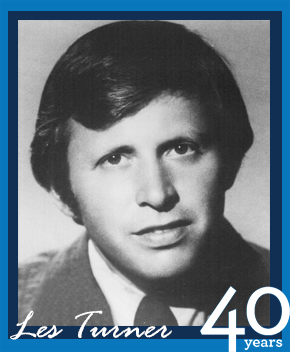
It all started with one man – Les Turner. At the age of 36, Les was an accomplished Chicago area businessman, married and raising three young sons. In 1976, he was hit with a fatal blow when he was diagnosed with ALS, a disease he and his network of close friends and family knew little about. Looking around, this tight-knit group found few resources or information on what was known as Lou Gehrig’s disease.
Les and his family were virtually alone in their fight.
But Les didn’t give up. He, along with his wife, Ina, her sister and her husband, Bonny and Harvey Gaffen, and their friends and family, decided to start a foundation that would raise funds to provide vital research and resources to ALS patients and families. No one would have to go through this disease feeling alone and uninformed.
In 1977, the Les Turner ALS Foundation was officially launched.
Only a year later, Les passed away from the disease. But his legacy would go on to support thousands of people living with ALS and their families, growing stronger each year.
Forty years later, we still fight Les’ battle and continue his vision of ensuring all ALS patients and families have the resources, support and hope for a cure that were unavailable to him. We do this while continuing to fund world-class ALS research and clinical care.
In honor of our 40th anniversary, Les’ family has written a letter of thanks to the supporters who enabled the Foundation to grow into what it is today, the oldest comprehensive ALS group in the country.
Ken Hoffman
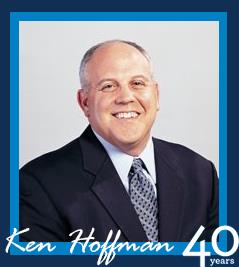
15 years ago, when Ken Hoffman’s mother, Harriet, was diagnosed with ALS, he knew little about the disease. Very quickly, Ken and his family began looking for answers. It was through that search he was introduced to the Les Turner ALS Foundation.
He turned to an old fraternity brother, Dr. Scott Heller, a neurologist at the Lois Insolia ALS Clinic, the patient care side of the Les Turner ALS Research and Patient Center at Northwestern Medicine.
With one phone call from Dr. Heller, Ken and his family immediately started receiving care at the clinic and support from the Foundation
“What stands out most to me as I reflect back on that tumultuous time is the passion, commitment and care my mother and father received from the Foundation throughout their entire journey with ALS.”
After Harriet passed away, Ken dedicated himself to making sure no family faced ALS alone and, in 2007, joined the Foundation’s Board of Directors. In 2014, with a vision to continue moving the Les Turner ALS Foundation closer to a cure, Ken took on the role of President of the Board.
Ken’s leadership of the Foundation is not only a direct result of having watched his mother live with the disease and seeing the incredible care she received along the way, but also experiencing that support for himself and the rest of his family.
“Everyone from the home and community services team and the office staff to the clinicians and researchers and my colleagues on the Board of Directors worked together to ensure my family had the best advice and that my mother had the greatest quality of life as the disease progressed. From day one, I understood that the number one priority of the Les Turner ALS Foundation is, and always will be, the patient.”
Umesh Saini
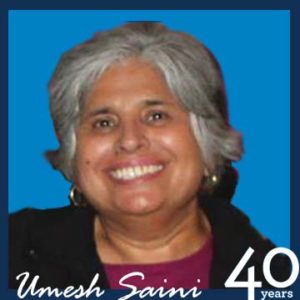
Born in Punjab, India, Umesh moved to the U.S with her husband, Sushil, and their two children in 2000. Employed as a caregiver at an assisted living facility, Umesh never suspected that her livelihood would become a crucial need of her own. After noticing weakness in her legs, she began to limp on the job. Umesh’s doctors shocked her family when they concluded that she had ALS. Initially distraught and depressed, Umesh feared for her future.
Soon after her diagnosis, the Sainis found the Lois Insolia ALS Clinic at the Les Turner ALS Research and Patient Center at Northwestern Medicine where Umesh learned about the unique programs and patient services the Les Turner ALS Foundation had to offer. In early 2012, she began receiving home visits from the Foundation’s Patient and Family Advocates. Through the culmination of support from the Foundation, care at the Clinic and love from her family, Umesh eventually accepted her diagnosis and vowed to live life boldly.
While she strived to maintain hope, the disease presented countless challenges for Umesh and her family, including financial restraints. Paying for necessary equipment, transportation to Clinic and constant caretaking, ALS proved to be an extremely costly disease to manage. The Saini family turned to the Foundation’s grant programs for relief. “The beauty of the Foundation’s various grant programs is that they cater to Umesh’s changing needs throughout the progression of her disease,” says Sushil. The Saini’s started using the Stuart Rosen Transportation Grant to help Umesh get to clinic and later utilized the Walter Boughton Patient and Family Services Grant to help her obtain a much needed power wheelchair.
Now, they turn to the Dan Nelson Respite Grant, which helps offset the cost of hiring a caregiver. Though Umesh’s family have been the primary caretakers since the beginning stages of her diagnosis, her progressing condition prompted them to hire additional assistance. With the grant, Umesh is now receiving care when her family is unavailable.“The Dan Nelson Respite Grant has allowed my husband and children to tend to everyday tasks without worrying about my safety. It not only helped me, it helped my entire family.”
Umesh attributes her quality of life to the network of support she receives from her family, the Clinic, the Foundation and most importantly, her mindset. “If I could offer advice to anybody living with ALS: be open to help and advice, and no matter what, never lose hope.”
Josh von Schaumberg
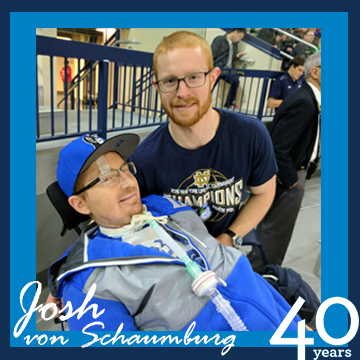 In 2013, Josh was a recent graduate from the University of Notre Dame with much more on his mind than job hunting. His 29-year-old brother, Eric, was recently diagnosed with ALS. The news was shocking–Josh never imagined that his beloved older brother would have a terminal disease or that he would need to care for him at such a young age. Immediately, the von Schaumburgs became proactive in finding support for Eric and the entire family.
In 2013, Josh was a recent graduate from the University of Notre Dame with much more on his mind than job hunting. His 29-year-old brother, Eric, was recently diagnosed with ALS. The news was shocking–Josh never imagined that his beloved older brother would have a terminal disease or that he would need to care for him at such a young age. Immediately, the von Schaumburgs became proactive in finding support for Eric and the entire family.
When Eric started receiving care from the Lois Insolia ALS Clinic at the Les Turner ALS Research and Patient Center at Northwestern Medicine, Josh was introduced to the ultimate support group: The Les Turner ALS Foundation’s Young ProfessionALS Group (YPG). Through the organization, Josh was able to meet other young Chicagoland working professionals with one common goal: finding a cure for ALS.
From casino nights to pub crawls, to monthly meetings at restaurants or members’ homes, YPG has provided Josh the opportunity to engage in a vital community that benefits those living with ALS and their loved ones. Though Josh has made many friends and lasting memories through YPG, the group is far more than a social network. YPG serves as both an outlet of joy to fortify Josh’s motivation in finding a cure, and an outlet of strength assisting his ability to provide the care and support Eric deserves. “While the YPG events are always a blast, giving back to the Foundation that has provided such necessary support to my family, is an honor.”
The positivity and sense of hope created by YPG helps members like Josh transcend the pain of coping with a loved one living with ALS, and enables him to channel his energy into planning, discussing and creating ways to raise funds and awareness for those bravely battling the disease, like Eric.
Josh’s favorite YPG memory dates back to 2014 at his first NCAA Bracket Challenge Kickoff Party. The number of participants far surpassed his expectations and the amount of support he felt that night made Josh realize how instrumental YPG is in the lives of young people impacted by ALS. From watching basketball with new friends to catching up with old buddies, the YPG event not only raised crucial funds for ALS research and patient care, it was also a reminder that nobody is going through the fight alone.
Although the effects of ALS are devastating, the support and camaraderie of YPG ensures that there is always hope. Today, hope fuels Josh as he cares for Eric throughout his courageous journey. “From the multidisciplinary clinic for my brother, the social work support for my family and the influence of YPG on my life, the Les Turner ALS Foundation continues to make this unthinkable hardship easier for us all.”
Cindy Fluxgold
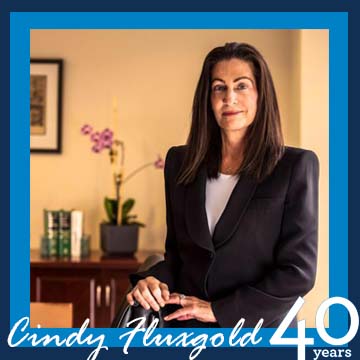 “We walk for those who cannot stand, we raise funds for those who cannot move and we spread awareness for those who cannot speak,” Cindy reflects on over 20 years of experience as captain of the Lincoln Park Tag Days drive. During the month of May each year, Cindy and her group of volunteers put on yellow vests, grab donation jugs and take to the streets to raise crucial funds and awareness about ALS. In honor of her mother who passed away from ALS, Cindy uses Tag Days to educate others about the disease and ensure that nobody feels alone in their fight.
“We walk for those who cannot stand, we raise funds for those who cannot move and we spread awareness for those who cannot speak,” Cindy reflects on over 20 years of experience as captain of the Lincoln Park Tag Days drive. During the month of May each year, Cindy and her group of volunteers put on yellow vests, grab donation jugs and take to the streets to raise crucial funds and awareness about ALS. In honor of her mother who passed away from ALS, Cindy uses Tag Days to educate others about the disease and ensure that nobody feels alone in their fight.
When Cindy’s mother was diagnosed with ALS in 1992, the future was uncertain. To get informed, Cindy visited the Northwestern Medicine library to read about the effects of ALS. She was horrified to learn that there was no known cure or treatment and frantically began looking for options. Her search led to the Lois Insolia ALS Clinic at the Les Turner ALS Research and Patient Center at Northwestern Medicine where her mother promptly began receiving care.
Inspired by her mother’s resilience, the innovation of the researchers and the care from the clinicians, Cindy wanted to take action for the ALS community, and started a Tag Days drive in her neighborhood. Although the mechanics of the event involve the grassroots task of raising pocket-change from passersby, the true purpose of Tag Days for Cindy is to inform others about the devastating impacts that ALS had on her mother and their family, as well as the support the Les Turner ALS Foundation provided them. Through Tag Days, Cindy realized the value of her voice and uses it to motivate others that their voices, too, can make a difference in the lives of those living with ALS. “Tag Days is first and foremost a tool to spread awareness, the fundraising component is just an extra result.”
The tremendous growth of the Lincoln Park Tag Days Drive over 20 years can be attributed to Cindy’s commitment to spreading the word. In 2016, the Drive raised nearly $6,000, grew to a group of 50 volunteers and inspired the new online Cyber Drive option. The more people educated about ALS, the easier it is to cultivate support for advancements in research and patient care for those like Cindy’s mother.
Although her mother passed away after courageously battling ALS, Cindy continues to honor her through supporting the Foundation and intends to carry the tradition as long as she can. “My family and I will participate in Tag Days for as long as it takes–we want to be here when the Foundation closes their doors, turns off their lights and announces, ‘we found a cure.’”
Patti Greer
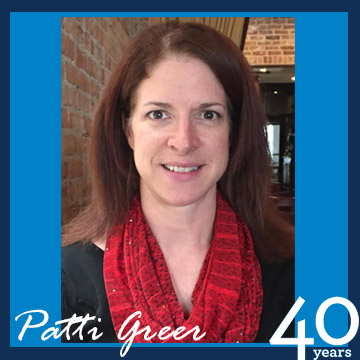 Patti always prioritized leading a healthy lifestyle. As a passionate marathon runner, nurse practitioner for the Navy and mother of two athletic sons, Patti thrived in her fast paced life. But now, every single step is a challenge. Diagnosed with ALS in November of 2016, Patti was forced to cope with the symptoms of the disease, including the slow loss of mobility and strength in her legs. Although daily tasks are now more challenging, Patti refuses to let the disease damper her ambitions or prevent her from embracing her busy, colorful and active life. Encouragement from her family, fellow members of the Libertyville Running Club and the Les Turner ALS Foundation reminds her how much she can still do.
Patti always prioritized leading a healthy lifestyle. As a passionate marathon runner, nurse practitioner for the Navy and mother of two athletic sons, Patti thrived in her fast paced life. But now, every single step is a challenge. Diagnosed with ALS in November of 2016, Patti was forced to cope with the symptoms of the disease, including the slow loss of mobility and strength in her legs. Although daily tasks are now more challenging, Patti refuses to let the disease damper her ambitions or prevent her from embracing her busy, colorful and active life. Encouragement from her family, fellow members of the Libertyville Running Club and the Les Turner ALS Foundation reminds her how much she can still do.
As soon as Patti started receiving care from the Lois Insolia ALS Clinic at the Les Turner ALS Research and Patient Center at Northwestern Medicine in 2016, she was amazed by the various support options. From expert clinical care, to educational seminars and the Foundation’s Patient & Family Advocates, Patti knew all aspects of her life were enriched. “The Foundation provided so many modes of support; from physical help, to informational discussions, and most importantly, social interactions with those that understood my struggle.”
Patti was most intrigued by the countless ways she could contribute to the ALS community through the Foundation. Being a runner, the Foundation’s Strike Out ALS 5k and 1 Mile Run, Walk & Roll particularly sparked her interest. By recruiting her family, friends and Libertyville Running Club teammates, she aims to inspire others to take action, “I believe that all people, even those without a personal connection to ALS, should run or walk in the Strike Out 5k for one simple reason: because they can.”
Even the diminishing strength of her legs will not stop Patti from crossing a finish line. In May of 2017, Patti competed in a Wisconsin Marathon—her ten year old son running with her, eventually pushing her in a transport chair for the final mile. This experience was pivotal in fortifying her will to participate in races, like the Strike Out 5k, with her loved ones alongside her.
Patti realizes the importance of appreciating the seemingly small beauties in life, “Any runner has the amazing ability to do what others, like me, can no longer do.” By continuing her passion at events like the Strike Out ALS 5k, Patti hopes to motivate others affected by ALS to persevere on the track and in their daily lives. “At the end of the day, I realize that I have a lot to live for.”
Pat Casey
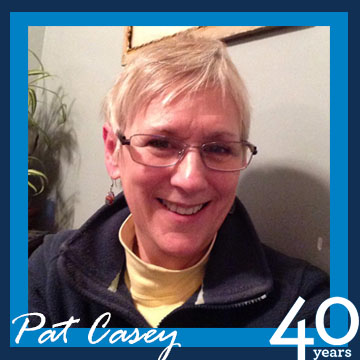 After three decades of working at the Lois Insolia ALS Clinic at the Les Turner ALS Research and Patient Center at Northwestern Medicine, Patricia (Pat) Casey, Clinical Research Coordinator and the Center’s first Occupational Therapist, officially retired in July 2017. Pat’s work was instrumental in fortifying the multidisciplinary Clinic and expanding the services provided to people living with ALS (PALS).
After three decades of working at the Lois Insolia ALS Clinic at the Les Turner ALS Research and Patient Center at Northwestern Medicine, Patricia (Pat) Casey, Clinical Research Coordinator and the Center’s first Occupational Therapist, officially retired in July 2017. Pat’s work was instrumental in fortifying the multidisciplinary Clinic and expanding the services provided to people living with ALS (PALS).
Starting her thirty-year career as the Center’s Occupational Therapist, Pat regularly went on home visits—a concept that paved the way to the creation of the Foundation’s Patient and Family Advocate team. “The one thing I will always remember from my time at the Clinic was being able to directly interact with people living with ALS. I loved hearing their stories and helping them in any little way possible.”
Her lifelong career in ALS and occupational therapy (OT) was inspired by her older sister, diagnosed with polio, another neurological disease. Determined to help people like her sister, Pat relocated from her home state of Colorado to Chicago and became involved with the Les Turner ALS Foundation through her work at the Clinic. Experiencing first-hand how the services improved the lives of PALS, Pat reflects on the Center’s success: “The growth we’ve made is incredible—from the specialists to the researchers and clinicians–the Center is an oasis for so many people.”
Adapting to change was a key lesson Pat learned throughout her career. As an occupational therapist, her primary task was to help patients adapt to the changing needs of daily living—both physical and emotional. Pat emphasizes this in the definitive guide on caring for PALS through OT: “Living life always means change, but living with ALS presents unique challenges. ALS forces you to adapt to your environment—but also, the environment must be adapted to fit their needs,” (Amyotrophic Lateral Sclerosis, A Guide for Patients and Families, 2009).
Acknowledging her own background and expertise, Pat knows that the end goal can only be accomplished through a strong sense of teamwork. Pat views the Clinic as the perfect hub for collaboration. “I am only a small part of the larger equation. No matter how great we are at our jobs, we cannot do it alone. It takes a whole team to make advancements in ALS research and patient care.”
As the years passed, Pat’s profession became more than a job, it transformed into a passion—one that surpassed the time restraints of her career. Although Pat has officially stepped down from her role, she intends to remain involved with the Foundation and its mission, “Even though I am retired, my motivation to contribute to a cure for ALS will never waver.”
Evangelos Kiskinis, PhD
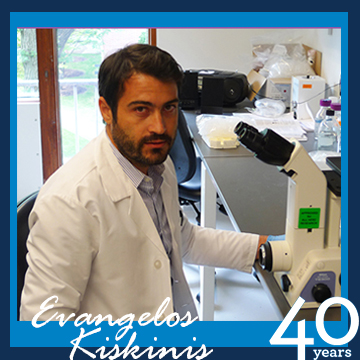 In 2014, the Les Turner ALS Foundation commited $10 million to establish the Les Turner ALS Research and Patient Center at Northwestern Medicine. The Center brings all ALS research and patient care together under one umbrella. Evangelos Kiskinis, PhD, has lead a research lab at the Center since 2015. Learn more about Dr. Kiskinis’s thoughts on the growth of his lab, the importance of the Foundation and his hope for the future of ALS research and patient care:
In 2014, the Les Turner ALS Foundation commited $10 million to establish the Les Turner ALS Research and Patient Center at Northwestern Medicine. The Center brings all ALS research and patient care together under one umbrella. Evangelos Kiskinis, PhD, has lead a research lab at the Center since 2015. Learn more about Dr. Kiskinis’s thoughts on the growth of his lab, the importance of the Foundation and his hope for the future of ALS research and patient care:
1. How did you get involved with the Les Turner ALS Research and Patient Center?
I was at the Harvard Stem Cell Institute, and met Dr. Dimitri Krainc, the Northwestern Chair of Neurology, at one of our events. What attracted me the most to the Les Turner ALS Center was that the clinic care, research and education are all under one roof—it was something that I found truly unique. After hearing about an opportunity to lead a research lab, I was interested immediately.
2. How has the Les Turner ALS Foundation been instrumental in supporting your research?
A key component that supports my research is the collaboration we receive from the clinicians.The direct interaction with clinicians, who directly interact with ALS patients, helps us researchers think about ways to approach a problem and clarify their needs. The Foundation’s longtime support and creation of the Center facilitates this unique collaboration that I believe gives us a fighting chance towards a cure.
3. Why is the Les Turner ALS Research and Patient Center essential for the worldwide mission to find a cure for ALS?
If we can solve and better understand ALS, it will elicit our understanding of other neurodegenerative diseases that affect a large portion of our population worldwide. A cure will not only be used to ease the pain of people living with the disease and their loved ones, it will catalyze research advancements for other neurodegenerative diseases that impact an even larger portion of our population.
4. What can people affected by ALS be hopeful about in terms of research?
My view is that there has never been a more exciting and optimistic time for ALS research. The awareness of the disease is at an all-time high, not where it should be, but at least it has increased over the last 10, even five years. The interest from pharmaceutical companies has increased because they view a cure for ALS as the start of solving other neurodegenerative diseases. There have been tremendous breakthroughs in ALS research, specifically related to the genetics of the disease. We know more than 20 genes causing ALS. These discoveries have revamped and re-invigorated the research in the field.
Jeff Arison
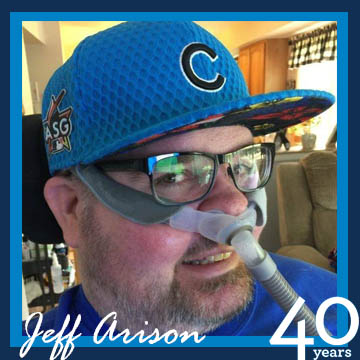 Jeff Arison’s ideal day consists of live Chicago music, making memories with friends and family and most importantly, watching the latest Cubs baseball game. These activities are more than just pastimes for him; they are emotional escapes from the struggle of living with ALS.
Jeff Arison’s ideal day consists of live Chicago music, making memories with friends and family and most importantly, watching the latest Cubs baseball game. These activities are more than just pastimes for him; they are emotional escapes from the struggle of living with ALS.
After being diagnosed with ALS in 2011 at the age of 31, Jeff yearned for support—a home base, that he could always turn to. He found just that, at the Lois Insolia ALS Clinic at the Les Turner ALS Research and Patient Center at Northwestern Medicine. “After my first appointment, I knew the Les Turner ALS Foundation’s knowledge and support throughout my fight would be a game changer in my journey with ALS.”
As a patient of the Clinic, Jeff is able to enjoy monthly visits in the comfort of his own home from a nurse and social worker on the Foundation’s Patient and Family Advocate Team. “The team is always accessible, they remain one step ahead and they always do so with compassion in their hearts.”
When Jeff moved to Florida for three years, the Foundation’s support followed him across the country. In lieu of home visits, the team provided virtual support through phone and video calls. Although he was over 1,000 miles away, the Les Turner ALS Foundation was still his home base. Eventually, Jeff boarded a plane back to Chicago to receive superior care at the Clinic he could not find anywhere else.
Regardless of distance, home has a way of remaining in our hearts. For Jeff, the Foundation’s support gives him a sense of care and security. “I hope and pray that the Les Turner ALS Foundation can continue providing such wonderful services and, like they did for me, make all those living with ALS feel at home.”
Wendell Meyer
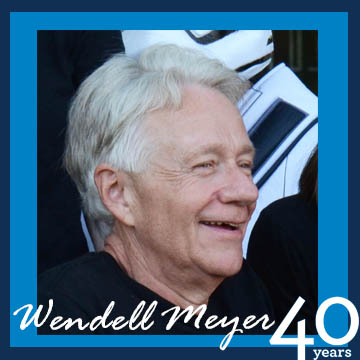 “ALS is a difficult disease to diagnose because there is no test mechanism and every individual case can be different,” says Wendell Meyer, person living with ALS.
“ALS is a difficult disease to diagnose because there is no test mechanism and every individual case can be different,” says Wendell Meyer, person living with ALS.
“I felt lost, but found hope and direction when I connected with the Les Turner ALS Foundation.”
After being diagnosed with ALS in 2016, Wendell was distraught. With a profession in information technology, Wendell yearned to learn about all the intricate facets of ALS. The Les Turner ALS Research and Patient Center at Northwestern Medicine supported his determination by providing action plans, physical and emotional care, education and ways for him to give back to the ALS community. “The Foundation has been incredible in guiding me and my family towards logical decisions not only to help myself, but to think about all others that may be diagnosed with ALS in the future.”
The motivation to help others with ALS drove Wendell to take part in the National ALS Registry. The Registry is a program to collect, manage and analyze data about persons with ALS (PALS). Researchers can use Registry data to look for disease pattern changes over time and try to identify whether there are common risk factors among PALS. Additionally, the Registry provides participants resources like ALS clinical trial information.**
“I participated in the National ALS Registry because this disease is not just confined to Chicago, I wanted to help researchers thoroughly examine ALS using national trends,” Wendell emphasizes. “The Foundation makes it seamless, stress-free and easy to participate.”
Cara Gallagher, MA, works as the Foundation’s National ALS Registry Associate to assist PALS, like Wendell, with the registration process. “The more people who register, the more data we can contribute that may help with future drug developments and treatments for ALS. We are here to support our patients every step of the way.”
Wendell recognizes his ability to directly contribute to research and wants to inspire others to do the same. “The amount of information about ALS is growing and every patient’s experience can be unique. The National ALS Registry helps us unite the phenomenal research at the Center with trends nationwide. It’s our best shot towards a cure.”
**”National Amyotrophic Lateral Sclerosis (ALS) Registry.” Centers for Disease Control and Prevention. Centers for Disease Control and Prevention, 04 Jan. 2017. Web. 11 Oct. 2017.
The Haines
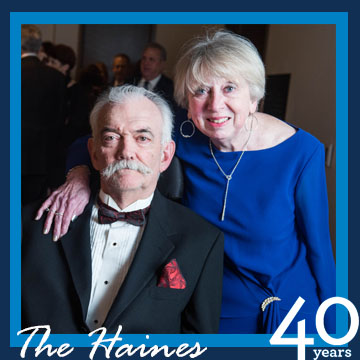
“I admire my husband, who served in the Army, and I am proud to be his caregiver despite how hard it gets. Support from others, like those at the Les Turner ALS Foundation, makes me stronger.”
Heroes come in all different forms. Barbara Haines is a hero who serves as a caregiver for her husband, Bob, who heroically served in the Army and now lives with ALS. In honor of Veterans Day on November 11 and National Caregivers Month throughout the month of November, we thank those who fought for our freedom, recognize the courageous vets who also fight ALS and show our appreciation for those who dedicate countless hours to caring for their loved ones.
ALS has taken away Bob’s ability to do most things independently and he relies on Barb for daily tasks such as brushing his teeth, bathing and feeding. Barb attributes much of her knowledge about ALS and caretaking to the Foundation: “The Foundation not only helps Bob, they also do a remarkable job of helping ME. A social worker from the Patient and Family Advocate team provides emotional support in our home. They also educate me about the disease, which helps me provide better care for Bob.”
Being a caregiver is no easy feat, but Barb takes pride in helping her husband, who sacrificed so much for our country. “It’s important for us to thank our veterans for the courage they’ve shown.”
Barb also advises that all caregivers remember to take care of their own well-being while caring for their loved one: “If you are a caregiver, take things day by day. Live in the moment and move forward.”
Happy Veterans Day to all the brave individuals in uniform who fought for our country and now battle ALS. We also thank the caregivers who provide care and strength to those living with the disease. This month, we celebrate and honor all types of heroes. Whether you are a veteran or caregiver, you are a hero in the eyes of many.
Robert Kalb
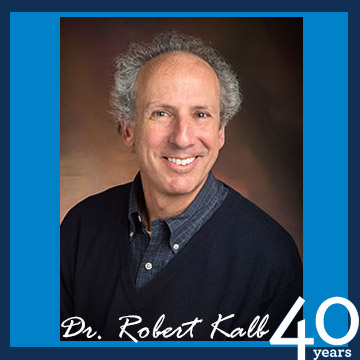
Join us in welcoming Robert Kalb, MD, the inaugural Director of the Les Turner ALS Research and Patient Center at Northwestern Medicine and Chief of Neuromuscular Medicine in the Ken & Ruth Davee Department of Neurology.
Learn about Dr. Kalb’s goals, expectations and hopes for the future of the Les Turner ALS Research and Patient Center at Northwestern Medicine (Center):
Tell us about your vision for the Center.
My vision is realistic: the road to a cure is a marathon, not a sprint. It won’t just depend on me, it will require the collaborative work of all our efforts over a very long duration of time—but I am extremely optimistic for the future of the ALS community. Taking on this position is an absolute honor. It is an amazing time to seek and understand fundamental problems in ALS and translate them into effective therapies.
What are a few of your long term goals for the Center?
First, I want to ensure we continue to provide the best possible care for those living with ALS. Second, I aim to strengthen our ability to translate observations made in our research labs into patient care and also utilize those observations to fortify our clinical trial program. Lastly, I recognize the quality research being done at the Center. I wish to leverage our existing partnerships to better connect us to the national and global ALS community.
How do you think your prior experience will aid you in your role as Center Director?
My prior experience has shaped my ability to speak both the ‘clinical language’ and ‘research language.’ This skill makes integration between ALS research and patient care more seamless. In discussions with the scientists, I can help them think of ways their research can potentially be applicable to caring for our patients. Similarly, when meeting with the clinicians, I can educate them in regards to specific research in the pipeline, which will prepare them if we translate those research discoveries into new therapies. I’m hoping that with my skill of speaking both those languages, I can encourage improved integration between elements of research and patient care.
How would you define the Center’s role in the ALS community?
The Foundation and Center’s role in the world of ALS is to be a leader in cultivating partnerships: partnerships with other organizations, other researchers and most importantly, the ALS community.There are very few places in the country, and perhaps the world, that have such strong advocacy efforts and ties to the community like the Les Turner ALS Foundation.
What else would you like to say to people living with ALS and the ALS community?
I am excited and hopeful. We are all working to find answers, but the future depends on everyone’s willingness: the willingness of the Foundation staff and board, individuals at the Center and Clinic, and most importantly, the willingness of our donors to support the research that leads us to those answers. Through our combined, enduring efforts and integration into the larger community, we will find a cure.

